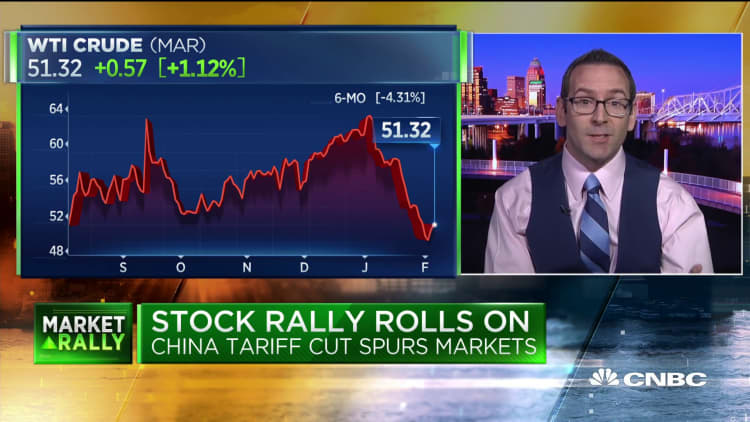Global oil demand will peak around 2040 – or "much sooner" – the International Monetary Fund (IMF) said in a new report on the future of oil.
The IMF said that this could have a "significant" impact on oil-exporting countries, predominantly those in the Middle East whose existing financial wealth could be depleted in the next 15 years if major reforms aren't undertaken.
"Growth of global oil demand will significantly decelerate, and its level could peak in the next two decades," the IMF said in its report entitled, "The Future of oil and fiscal sustainability in the GCC Region," published Thursday.
The IMF said analysis of past oil market developments revealed "a strong and sustained declining trend in the global oil demand, after accounting for income and population growth."
This reflected a range of factors, the IMF said, such as long-term improvement in energy efficiency and substitution away from oil, trends that had so far been "veiled by the effects of economic and population expansion."
"But it is poised to become more visible in the coming years, resulting in a path of gradually slowing—and eventually declining—global demand for oil. The latter would peak by around 2040 in our benchmark projection or much sooner in scenarios of stronger regulatory push for environmental protection and faster improvements in energy efficiency."
Growth of global demand for natural gas is also expected to slow, the Fund said, "although it is expected to remain positive in the coming decades."
The IMF is not the first to make predictions about a decline in global oil demand. In late 2019, Neil Atkinson, head of the oil industry and markets division at the International Energy Agency, told CNBC that population growth remained the key driving force for oil demand, which he said could peak in the 2030s.
"If we have a much more business-as-usual (approach) with much more limited (environmental) policy implementation then the profile of oil demand will be of continued growth. But if the world does implement policies more rigorously, as it's showing signs of doing today, then the peak could come in the late 2020s, 2030s," he said.
"We don't know that but we do know though is that even when oil demand does peak at some point in the future, it isn't going to drop off a cliff because substitute-ability for oil in so many sectors is still elusive – shipping, aviation, trucking, petrochemicals – there are still huge driving forces (for oil demand)," Atkinson told CNBC's Squawk Box Europe in November.
He said Saudi Arabia, the second largest oil producer in the world after the U.S. and ahead of Russia, was a cornerstone of that future oil supply. "There's going to be rising demand for at least the next decade for oil products, possible longer, and this is cementing their role as the cornerstone player in global markets, the most reliable and biggest supplier in markets," he said.
GCC wealth to fall?
Anticipating and preparing for what comes next will be critical for oil-exporting regions, including countries of the Gulf Cooperation Council (GCC) which is home to the largest concentration of oil exporters, collectively producing over one-fifth of the global oil supply.
Oil producers like Saudi Arabia are seeking to diversify their economies away from their dependence on oil but, as the IMF noted, the commodity remains critical.
"Although the importance of non-oil sectors has increased in recent decades, many of them rely on oil-based demand either in the form of public spending of oil revenue or private expenditure of oil-derived wealth," the IMF said.
"The 2014–15 oil price shock, which notably slowed non-oil growth in most of the region, was a stark reminder of this dependence. Recognizing this challenge, the GCC countries are all implementing programs to diversify their economies as well as fiscal and external revenues away from oil. The success of these programs will be central to achieving strong and sustainable growth in the years to come."
The IMF said that the slowing global demand for oil spells a "significant fiscal sustainability challenge for the GCC region."
"The decline in oil revenues (since 2014) sparked a period of intensive reforms, including sizable fiscal consolidations. Nevertheless, the effect of lower hydrocarbon revenue is yet to be fully offset. And the resulting fiscal deficits have lowered the region's net financial wealth during 2014–18. A path of prolonged deceleration in hydrocarbon revenue growth would add to this decline in wealth. At the current fiscal stance, the region's existing financial wealth could be depleted in the next 15 years."

The IMF said that the fiscal policy need implied by this challenge is both larger and more urgent when compared to countries' existing plans.
"All GCC countries have recognized the lasting nature of their challenge and are already planning continued fiscal adjustment in the context of their broader strategic long-term visions. However, the expected speed and size of these consolidations in most countries may not be sufficient to stabilize their wealth."
"These adjustments need to be accelerated and sustained over a long period of time, in line with the expected path of hydrocarbon revenue, the IMF argued.
"Managing the long-term fiscal transition will require wide-ranging reforms and a difficult inter-generational choice. Continued economic diversification will be important but would not suffice on its own. Countries will also need to step up their efforts to raise non-oil fiscal revenue, reduce government expenditure, and prioritize financial saving when economic returns on additional public investment are low."


